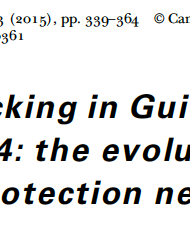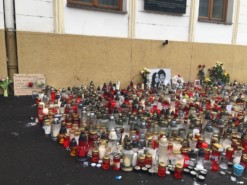Abajo en Español
The Turkish government’s recent crackdown on the country’s police, military, and judiciary has led to the emergence of a permissive environment for many kinds of smuggling, trafficking, and terrorist financing.
Triggered by the graft scandals unveiled on December 17 and 25 of 2013 and the government’s proclivity toward authoritarianism, Turkey seems to be moving away from the West and its relationships with European countries and the United States. In both scandals, the police detected serious corrupt activity by Turkish government ministers that involved an Iranian money launderer and facilitator, Reza Zarrab, who was arrested in the United States in March 2016 on charges similar to those the Turkish police announced in the December 17 scandal, and the son of President Recep Tayyip Erdogan.
After these scandals, the government accelerated the momentum toward authoritarianism, exhibiting a retaliatory attitude by purging thousands of police officers, military personnel, and judiciary personnel. The motivation behind this crackdown was to prevent any future investigation that could aim to disclose any government linkage to terrorist financiers and corrupt businessmen.
However, these purges have created vacuums in many areas that have been filled by organized crime and terrorist groups. Although the police operations in these graft scandals were conducted by only the Istanbul Financial Crimes Unit, the entire drug trafficking unit was purged, and the government assigned to that unit police officers who lacked the skills for fighting against drug traffickers.
As an unintended result, the government has created a permissive environment for drug trafficking.
Turkish police had the capacity to seize tons of heroin, conduct around 30,000 drug operations, and arrest around 50,000 traffickers each year until 2014. In some years, the seizures by Turkish police exceeded the seizures in all European countries combined. Moreover, the Turkish drug unit had the capacity to provide international training programs for dozens of countries before 2014.
After 2013, law enforcement officials issued its yearly drug report only for 2014, which confirms the reduced capacity of law enforcement. In 2014, seizures of cannabis declined by 49.5 percent compared to 2013, while captagon seizures declined by 94.5 percent and ecstasy by 53.6 percent. The drug reports for 2015 and 2016 have not been released yet.
Seizures in high-volume heroin cities such as in Van, Istanbul, and Hakkari were much lower between 2014 and 2016 than they were before 2014. In Hakkari, one of the entry points for Iranian heroin, the police seized only 2.5 kilos of heroin in the first three month of 2014. That compares with around 500 kilos in the same period in 2013.
Also in 2014, traffickers began transferring huge amounts of heroin from Iran. The rare police seizure of drugs in other Turkish cities confirmed the opportunistic approach of the traffickers. They saw the weakness and incompetency that emerged as a result of purging entire anti-drug units and exploited the situation. For instance, in Erzurum and Kocaeli provinces, around 600 kg of heroin was seized in 2014. The fact that the traffickers have risked transferring larger amount of heroin indicates their confidence that they will not be interdicted. In a wiretapping recorded immediately after the purges in 2014, one of the Iranian traffickers said “…ship heroin as much as you can since there is a dissention between the government and law enforcement.”
The government’s firing of 21,777 police officers and 4,317 judges and prosecutors has left a vacuum and created an environment that facilitates Turkey becoming a heroin-processing country.
In the late 1970s, Turkey was pronounced as a processing country where Turkish Kurds processed opium into heroin in clandestine labs in areas closer to the Iranian border. This heroin was exported to Europe using various routes. There were no heroin-producing labs in Turkey between 2010 and 2012. Confirming this result, there were no seizures of any morphine-based materials used in processing heroin in Turkey in 2013. Unfortunately, the evisceration of law enforcement has returned Turkey to its status as a processing country and spurred processing activity in some counties in the cities of Hakkari, Mus, and Van.
Similarly, traffickers have begun to process methamphetamine in Turkey. News media reports confirm Turkey’s reemergence as a methamphetamine processing country, reporting that the police found laboratories in Istanbul, Gaziantep, and Bursa in 2015, 2016, and 2017. While Turkey was a trans-shipment country for Iranian methamphetamine until 2013, it has tended to become a source country since then.
Immediately after the assignment of new law enforcement and judiciary personnel, all wiretappings in drug trafficking investigations were shut down in early 2014. The closing of thousands of wiretappings brought about discontinuities in the fight against drug trafficking. Additionally, the purging of police officers who knew how to speak the Persian and Nigerian Igbo languages has presented more opportunities for Iranian and Nigerian traffickers who have active linkages to heroin and cocaine trafficking in Turkey.
Furthermore, the police have lost their ability to carry out organized crime investigations that include wiretapping, the deployment of undercover agents, and the use of surveillance. Rather, the newly assigned police have made ostensible antidrug operations involving thousands of officers, but they seized only several grams of cannabis. Being concerned about statistics, the police have exploited drug informants by making payments in return for seizing only the drug material. The police have arrested only the driver, a person with no connection to the drug trafficking group members, in these informant-exploited seizures.
It should be noted that Turkish police have scaled down their capacity to conduct international-level joint operations. The European drug liaison officers in Turkey have complained about the country’s lack of willingness and capacity to cooperate against transnational drug traffickers.
Although drug use in Turkey is at an alarming level, there are few news media reports about drug addicts because such reports are perceived as criticism of the government. Media outlets in Turkey are frightened about being misunderstood by the government and facing its wrath.
In a nutshell, it would not be wrong to say that the changes in government priorities and policies after the graft scandals in Turkey have crippled the country’s capacity to fight drug trafficking.
The purging of anti-drug units has generated a favorable environment for both local and transnational drug groups in the Balkans trafficking route that carries Afghan heroin via Iran and Turkey to European countries.
This blog has been written by Mahmut Cengiz, PhD who is an Adjunct Faculty and Research Scholar at TraCCC of the George Mason University and a Global Initiative Network Member.
Photo credit: Anadolu Agency
Cómo la mano dura en Turquía creó un ambiente tolerante al narcotráfico
Las recientes medidas contundentes tomadas por el gobierno turco sobre la policía, las fuerzas militares y el poder judicial del país han dado lugar al surgimiento de un ambiente permisivo para muchos tipos de contrabando, tráfico y financiación terrorista.
A partir de los escándalos de corrupción destapados el 17 de diciembre de 2013 y la tendencia del gobierno hacia el autoritarismo, Turquía parece alejarse de Occidente y de sus relaciones con Europa y los Estados Unidos. En ambos escándalos, la policía identificó serios casos de corrupción por parte de ministros turcos que involucraban al iraní Reza Zarrab, intermediario y blanqueador de dinero arrestado en los Estados Unidos en marzo de 2016 por cargos similares a los anunciados por la policía turca en el escandallo del 17 de diciembre, y al hijo del Presidente Recep Tayyip Erdogan.
Luego de estos escándalos, el gobierno aceleró su inclinación hacia el autoritarismo, exhibiendo una actitud vengativa que implicó la purga de miles de oficiales de la policía, personal militar, y personal judicial. El motivo detrás de estas medidas fue evitar cualquier investigación futura que intente revelar cualquier nexo entre el gobierno, financieros terroristas y empresarios corruptos.
No obstante, estas purgas han creado vacíos en muchas áreas que han propiciado el surgimiento de delincuencia organizada y grupos terroristas. A pesar de que las operaciones policiales durante estos escándalos fueron llevadas a cabo por la Unidad de Delitos Financieros, se purgó toda la unidad contra el narcotráfico, y el gobierno asignó a esa unidad oficiales que carecen de habilidades para luchar contra este flagelo.
Sin querer, el gobierno ha creado un ambiente tolerante al narcotráfico.
Hasta 2014, la policía turca tenía la capacidad de incautar toneladas de heroína, llevar adelante 30.000 operaciones en materia de drogas, y arrestar alrededor de 50.000 traficantes por año. En pocos años, los decomisos realizados por la policía turca superaron a los realizados en toda Europa. Además, hasta 2014, la unidad anti-drogas de Turquía tenía la capacidad de ofrecer programas internacionales de capacitación para docenas de países.
Después de 2013, la policía emitió su informe anual sobre drogas sólo para 2014, lo cual confirma su reducida capacidad. En 2014, las incautaciones de cannabis se redujeron en un 49,5% comparadas con 2013, mientras que las de captagón disminuyeron en un 94,5% y las de éxtasis en un 53,6%. Aún no se han publicado informes sobre los períodos 2015 y 2016.
Los decomisos en ciudades con gran presencia de heroína como Van, Estambul, y Hakkari fueron menores entre 2014 y 2016 comparados con lo que eran antes de 2014. En Hakkari, uno de los puntos de entrada de heroína iraní, la policía sólo decomisó 2,5 kilos de heroína en el primer trimestre de 2014. En el mismo período en 2013, el volumen fue de 500 kilos.
También en 2014, los traficantes comenzaron a transferir cantidades enormes de heroína desde Irán. Las escasas incautaciones de drogas en otras ciudades turcas confirman el oportunismo de los traficantes, quienes al ver la debilidad e incompetencia que surgió como resultado de purgar todas las unidades anti-drogas, explotaron la situación. Por ejemplo, en las provincias de Erzurum y Kocaeli, se decomisaron cerca de 600 kilos de heroína en 2014. El hecho de que los traficantes se hayan arriesgado transferir una mayor cantidad de heroína es prueba de que confían que no serán interceptados. En una escucha telefónica grabada inmediatamente luego de las purgas en 2014, uno de los traficantes iraníes dijo “…despacha toda la heroína que puedas ya que hay una desavenencia entre el gobierno y las fuerzas policiales.”
Debido a que el gobierno dio de baja a 21.777 oficiales de policía y a 4.317 jueces y fiscales, se ha generado un vacío y creado un ambiente que dio lugar a que Turquía se convierta en un país productor de heroína.
A finales de la década de 1970, Turquía fue pronunciada como un país de elaboración en donde los Kurdos turcos procesaban el opio en laboratorios clandestinos en áreas cercanas a la frontera con Irán. La heroína era posteriormente exportada a Europa a travez de varias rutas. No había laboratorios de heroína en Turquía entre 2010 y 2012. Confirmando este resultado, tampoco existieron decomisos de productos derivados de la morfina utilizados para procesar heroína en 2013. Lamentablemente, el desentrañamiento de las fuerzas policiales ha devuelto a Turquía a su estatus de país productor e incitado a la elaboración en algunos condados en las ciudades de Hakkari, Mus y Van.
De modo similar, se ha comenzado a procesar metanfetaminas en Turquía. Reportes periodísticos confirman el resurgimiento de Turquía como productor de metanfetaminas, e informan sobre el descubrimiento por parte de la policía de laboratorios en Estambul, Gaziantep y Burza en 2015, 2016, y 2017. Si bien hasta 2013 Turquía era un país de transbordo para las metanfetaminas de origen iraní, desde entonces ha tendido a convertirse en un país de origen.
Inmediatamente después de asignar nuevo personal policial y judicial, a principios de 2014 se cancelaron todas las las escuchas telefónicas con fines de investigación sobre narcotráfico, lo cual generó la discontinuidad en la lucha contra el tráfico de drogas. Además, la purga de oficiales de policía que conocían el idioma persa y el igbo nigeriano ha ofrecido más oportunidades para los traficantes iraníes y nigerianos con nexos activos con el tráfico de heroína y cocaína en Turquía.
La policía ha perdido su habilidad de conducir investigaciones sobre delincuencia organizada que impliquen escuchas, el despliegue de agentes encubiertos, y el uso de la vigilancia. En cambio, la nueva policía ha llevado adelante operaciones antidrogas ostensibles que han involucrado a miles de oficiales, pero tras las cuales sólo han incautado algunos gramos de cannabis. Preocupada por las estadísticas, la policía ha recurrido al uso de informantes, pagando a cambio de la incautación sólo del material para la elaboración de las drogas. Sin embargo, con esta estrategia la policía ha arrestado sólo al conductor, una persona sin ninguna conexión con los miembros del grupo traficante.
Es menester mencionar que la policía turca ha reducido su capacidad de conducir operaciones internacionales conjuntas. Han habido quejas por parte de oficiales europeos intermediarios en Turquía sobre la falta de voluntad y capacidad del país de cooperar contra el narcotráfico transnacional.
A pesar de que el consumo de drogas en Turquía está en niveles alarmantes, existen pocos informes periodísticos sobre drogadictos. Esto se debe a que tales informes son percibidos como una crítica al gobierno, y los medios temen ser mal interpretados y recibir su ira.
En resumidas cuentas, se puede decir que los cambios en las prioridades y políticas del gobierno luego de los escándalos de corrupción han paralizado la capacidad del país en la lucha contra el narcotráfico.
La purga de las unidades anti-drogas ha generado un ambiente favorable para grupos tanto locales como transnacionales en la ruta de los Balcanes, por la cual se moviliza heroína afgana via Irán y Turquía hacia los países europeos.
—-
Este artículo fue escrito por Mahmut Cengiz, PhD, Investigador adjunto del Centro para la Corrupción, Delincuencia Transnacional y Terrorismo (TraCCC) de la Universidad George Mason y Miembro de la Red de Profesionales de la Iniciativa Global.
Fotografía: Anadolu Agency



